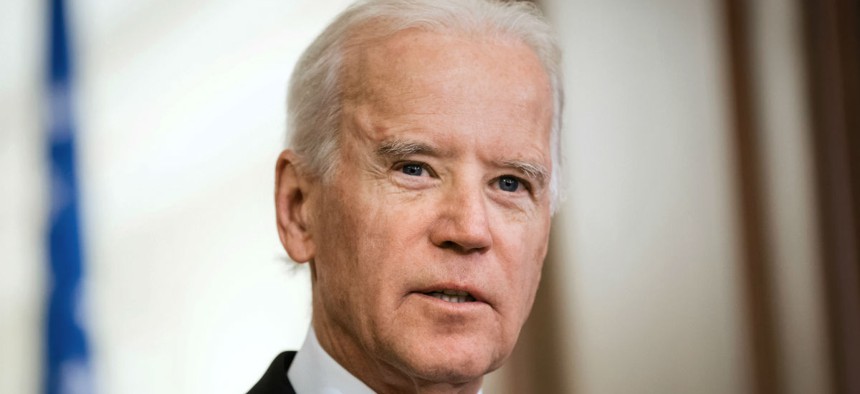
Vice President Joe Biden Drop of Light / Shutterstock.com
Joe Biden's New Mission: Selling the Iran Deal
President Obama has dispatched his favorite Hill ambassador to persuade Democrats to back the nuclear agreement.
It's a familiar pattern: President Obama has a complicated deal he needs to get through Congress, so he sends Vice President Joe Biden to the Hill to sell it.
Just a day after he announced a potentially legacy-ensuring nuclear agreement with Iran, Obama once again dispatched Biden, his favorite emissary, to spearhead a difficult lobbying effort. With the Obama presidency winding to a close and Biden publicly undecided on whether to run for the top job himself, the Iran talks could prove to be one of Biden's most important—and potentially one of his last—acts in politics.
And while Biden has often been tapped in the past to take advantage of his friendly relationships with Senate Republicans, this time his mission is focused on persuading his fellow Democrats.
Republicans in both chambers are already balking at the deal, so a resolution of disapproval that could kill the Iran deal seems likely to pass both chambers. Obama has vowed to veto such legislation, but he'll need cooperation from at least 146 Democrats in the House and another 34 in the Senate to uphold that veto.
Given his foreign policy bona fides, Biden is working as the administration's ambassador to the Hill to ensure that those votes are there.
After Obama alerted congressional leaders of the pending deal on Monday night, the vice president hopped on the phones early Tuesday morning, speaking with Senate leadership and a handful of rank-and-file members who will be key to getting the deal through Congress. Wednesday morning, Biden made the trip in person to Capitol Hill to spend quality time with House Democrats, and he will meet Thursday with Democrats on the Senate Foreign Relations Committee.
Sen. Christopher Coons, a member of the Senate Foreign Relations Committee, said he spoke with Biden by phone for about 30 minutes on Tuesday and asked the vice president a series of questions about inspection provisions, restraints on the research and development of centrifuges, and lifting of an arms embargo—all concerns that have been raised by Republican opponents and on-the-bubble Democrats alike. On the arms embargo, Coons said Biden gave a "very helpful insight" that a "specific piece of sanctions" enacted while the former senator was Foreign Relations chairman would remain in place.
Coons said he isn't surprised that the White House has tapped Biden to take the lead in convincing Democrats who, like himself, remain undecided on the Iran deal.
"The vice president is one of the most seasoned and senior leaders in national security and foreign policy in our country, and so I would expect that he would be centrally involved in educating, briefing, engaging members of the Senate," Coons said. "He's also one of the most trusted senators, as someone who has had a long and strong relationship with our allies in the region, so if I were giving the administration advice I would certainly recommend that they call on the vice president to play a central role in engaging and educating senators."
Biden also spoke on Tuesday with Sen. Ben Cardin, the ranking member on the Foreign Relations panel, who will be key in cobbling together Democratic votes to uphold the Iran deal—that is, assuming he backs it himself.
Cardin said one of his outstanding concerns relates to the lifting of the arms embargo after five years, including "how they got into the discussions and what impact it has on arming of certain different entities, and how it affects U.S. sanctions on the arms embargo."
Although he is publicly undecided on the Iran agreement, Senate Foreign Relations Chairman Bob Corker said that he'd spoken with Biden "multiple" times before the deal was announced, but that the vice president had not called to lobby him to support the deal. "I think they know I'm a facts guy. I mean, I want to understand the deal. Sort of aw-shucks lobbying isn't my thing," Corker said. "We talk with each other when we need to talk with each other. ... But I would guess they would be doing sort of the aw-shucks lobbying effort more right now with Democrats. I want to understand the essence of the deal itself, and those things don't really shed light on that."
And while Biden received applause at his meeting with House Democrats on Tuesday, members said that his pitch was mostly policy-focused and didn't appear to have immediately swayed many lawmakers into the White House's camp. "The vice president made as convincing an argument as he can make, but I think there's still a lot of questions to be answered," said Rep. Steve Israel. "I've been skeptical from the beginning of this. I'm still skeptical. … He did as good a job as he could do under the circumstances."
But Biden's campaign is far from over. Many members said that while they'd heard from the vice president and other members of the administration, they had a lot more reading and research to do before they make a decision and they expect to have many more questions for Biden and the White House before then.
Sen. Brian Schatz, who said he has not yet heard from Biden personally, praised the vice president as "the perfect point-person for this," noting: "He's persuasive and he has knowledge. He's got great bipartisan relationships and he has impeccable credentials when it comes to support for Israel and knowledge of the security needs in the region."
But, Schatz added, Biden isn't alone in his lobbying campaign.
A small group of Senate Democrats earned invitations to the White House on Wednesday afternoon for a 90-minute briefing from staff on the deal, including Sens. Al Franken, Martin Heinrich, and Joe Manchin. Sen. Tammy Baldwin was also invited to the meeting, but had a scheduling conflict.
Heinrich and Manchin both sit on the Senate Armed Services Committee, which will hold hearings on the deal. "They went over everything and explained to us how we got to where we are today, and everything they're doing," Manchin said.
The West Virginia Democrat said he appreciates the White House's outreach, calling the briefing "informative.
"It helps us because I'm looking for a pathway to basically have any stability, any peace, whatsoever," Manchin said.
Secretary of State John Kerry is also expected to be instrumental in securing support for the deal he helped to craft in Vienna. Kerry will testify before the House Foreign Affairs Committee next week. Kerry will also appear before the Senate Foreign Relations panel next Thursday, along with Moniz and Treasury Secretary Jacob Lew.
Kerry has been hitting the phones since early Tuesday morning, along with Energy Secretary Ernest Moniz, National Security Adviser Susan Rice, Deputy Secretary of State Tony Blinken, White House Chief of Staff Denis McDonough, and other administration officials and Cabinet members.
Sen. Tim Kaine said he'd spoken with Blinken in an early Tuesday morning phone call, as administration officials reached out to some senators to brief them on the plan.
"I had a long talk with Tony, which I really appreciated," Kaine said. "He answered a lot of my questions, but I had not read the document when I had the conversation with him, so now that he's kind of given me his pitch and answered questions, now I'm reading the document to try to reach my own conclusions."
The administration says it's keeping all options open as it works to sell the Iran deal to Congress. "As we have done throughout this negotiation, and as this Administration has committed to, we will continue to have conversations with Members of Congress—on both sides of the aisle and on both sides of the Capitol—to demonstrate directly to them that this good deal will effectively cut off all of Iran's pathways to a nuclear weapon," a White House official said in an email. "We will continue to host briefings, make calls, and testify at hearings to continue to make the case to Congress and the American people."
Alex Brown, Alex Rogers, and Rachel Roubein contributed to this article.
(Image via Drop of Light / Shutterstock.com)







